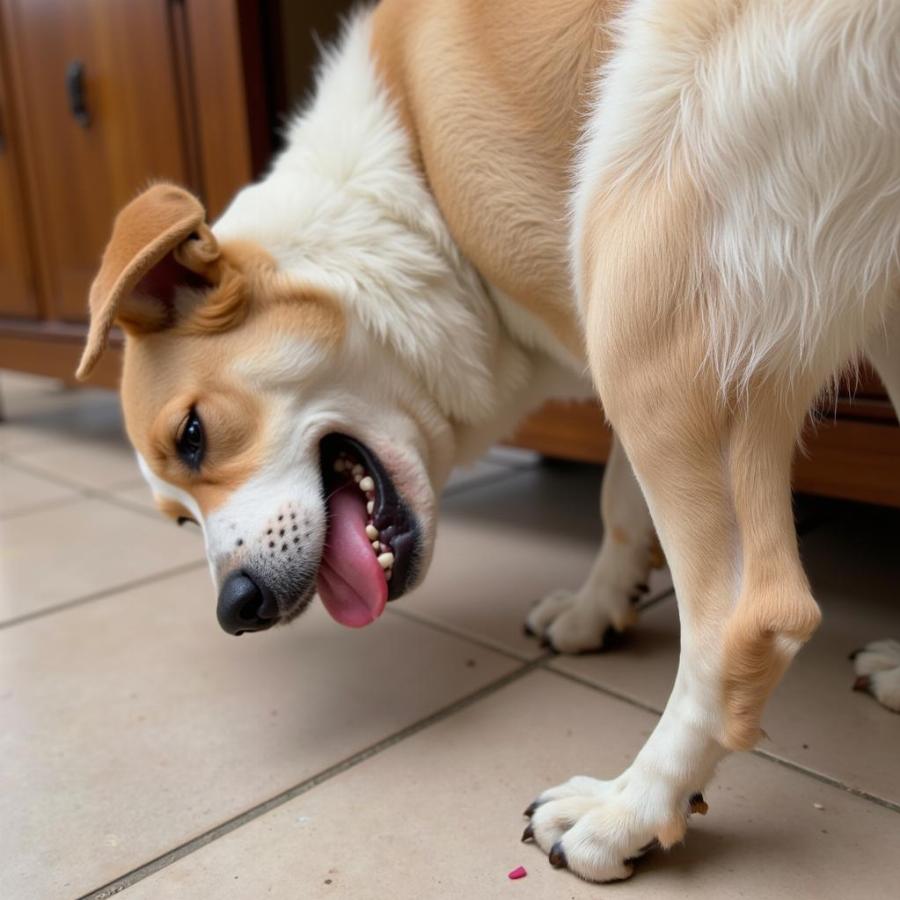Dogs licking their buttholes is a behavior that often leaves owners perplexed and sometimes disgusted. It’s a natural, albeit slightly unsettling, canine habit. But why do dogs lick their buttholes? Understanding the reasons behind this behavior can help owners determine when it’s normal and when it might signal a health issue requiring a vet visit.
Understanding the “Why” Behind Butthole Licking
Several reasons contribute to a dog’s tendency to lick their rear end. While cleanliness is a factor, it’s not the whole story. Sometimes, it’s a simple matter of hygiene, as dogs lack the dexterity to clean that area themselves. However, it can also indicate underlying medical issues, ranging from allergies to parasites. Let’s delve into the most common reasons:
Hygiene
Just like cats groom themselves, dogs instinctively try to keep themselves clean. Licking their butthole is one way they attempt to remove fecal matter or other debris that might be causing discomfort. This is particularly true for dogs with longer hair around their rear, which can trap dirt and feces.
Anal Gland Issues
Perhaps the most common medical reason behind excessive butthole licking is impacted or infected anal glands. These small sacs located on either side of the anus release a foul-smelling fluid during defecation. When these glands become blocked or infected, they can cause significant discomfort and itching, leading to increased licking.
Parasites
Intestinal parasites, such as worms, can also irritate a dog’s anus, prompting them to lick the area excessively. If your dog has worms, you might even see small white segments resembling grains of rice in their stool or around their anus.
Allergies
Allergies, whether food-related or environmental, can cause skin irritation and inflammation, including around the anus. This itching and discomfort can trigger excessive licking.
Behavioral Issues
In some cases, excessive butthole licking can be a sign of stress, anxiety, or boredom. This behavior can become a compulsive habit, similar to a human nervously biting their nails.
 Dog Licking Butthole for Hygiene
Dog Licking Butthole for Hygiene
When to Worry: Signs of a Problem
While occasional butthole licking is normal, excessive licking, accompanied by other symptoms, warrants a trip to the veterinarian. Here are some red flags to watch out for:
- Scooting: If your dog is dragging its bottom across the floor, it could be a sign of impacted anal glands or worms.
- Redness or Swelling: Inflammation around the anus indicates a potential infection or allergy.
- Excessive Licking of Other Areas: If your dog is also excessively licking its paws, belly, or other areas, it might suggest a broader allergy issue.
- Changes in Stool: Diarrhea, constipation, or bloody stool can be signs of parasites or other digestive problems.
- Whining or Discomfort: If your dog seems distressed while licking or exhibits other signs of pain, it’s crucial to seek veterinary attention.
How Can I Stop My Dog from Licking Their Butthole?
Addressing the underlying cause is the key to stopping excessive butthole licking. Here’s what you can do:
- Veterinary Check-up: A vet can diagnose and treat any underlying medical issues, such as impacted anal glands, parasites, or allergies.
- Regular Grooming: Keeping the area around your dog’s anus clean and trimmed can help prevent irritation and reduce the urge to lick.
- Dietary Changes: If allergies are suspected, your vet might recommend a hypoallergenic diet.
- Behavioral Modification: For anxiety-related licking, consult a certified dog trainer or behaviorist. They can help identify triggers and develop strategies to manage the behavior.
Is It Harmful for My Dog to Lick Its Butthole?
While occasional licking is generally harmless, excessive licking can lead to further irritation, skin infections, and even hair loss around the anus. Moreover, if the licking is caused by an underlying medical issue, delaying treatment can worsen the problem.
FAQs: Common Questions About Dogs Licking Their Buttholes
Q: Why does my dog suddenly lick his butthole more often?
A: A sudden increase in butthole licking can indicate a new issue, such as impacted anal glands, parasites, or an allergic reaction. It’s best to consult a vet.
Q: How often should I clean my dog’s anal glands?
A: Anal glands typically empty naturally during defecation. Only express them manually if recommended by a veterinarian. Over-expressing can cause irritation and damage.
Q: Can I express my dog’s anal glands myself?
A: While it’s possible to learn how to express anal glands, it’s best to leave this procedure to a veterinarian or professional groomer to avoid injury.
Q: What can I do to prevent my dog from getting worms?
A: Regular deworming medication, as prescribed by your vet, is the best way to prevent and treat intestinal parasites.
Q: How can I tell if my dog has allergies?
A: Common signs of allergies include excessive licking, scratching, skin redness, and hair loss. Consult your vet for diagnosis and treatment options.
Other Questions You Might Have
- How can I keep my dog’s anal area clean?
- What are the different types of dog dewormers?
- What are common food allergies in dogs?
Conclusion
While seeing your dog lick their butthole might not be pleasant, understanding the reasons behind this behavior can help you differentiate between normal hygiene and a potential health issue. Regular veterinary check-ups, proper grooming, and a healthy diet can help prevent many of the issues that cause excessive butthole licking. Remember, if you’re ever concerned about your dog’s behavior, it’s always best to consult with a veterinarian.
Related Articles on Beaut Dogs:
- Understanding Your Dog’s Anal Glands
- Common Dog Parasites and How to Treat Them
- Identifying and Managing Dog Allergies
Beaut Dogs is your go-to resource for all things related to dog care. We provide expert advice and helpful information to help you understand and care for your furry friend. For further assistance and personalized guidance, please contact us at [email protected]. Beaut Dogs is committed to providing accurate and up-to-date information to ensure the health and happiness of your beloved canine companion.